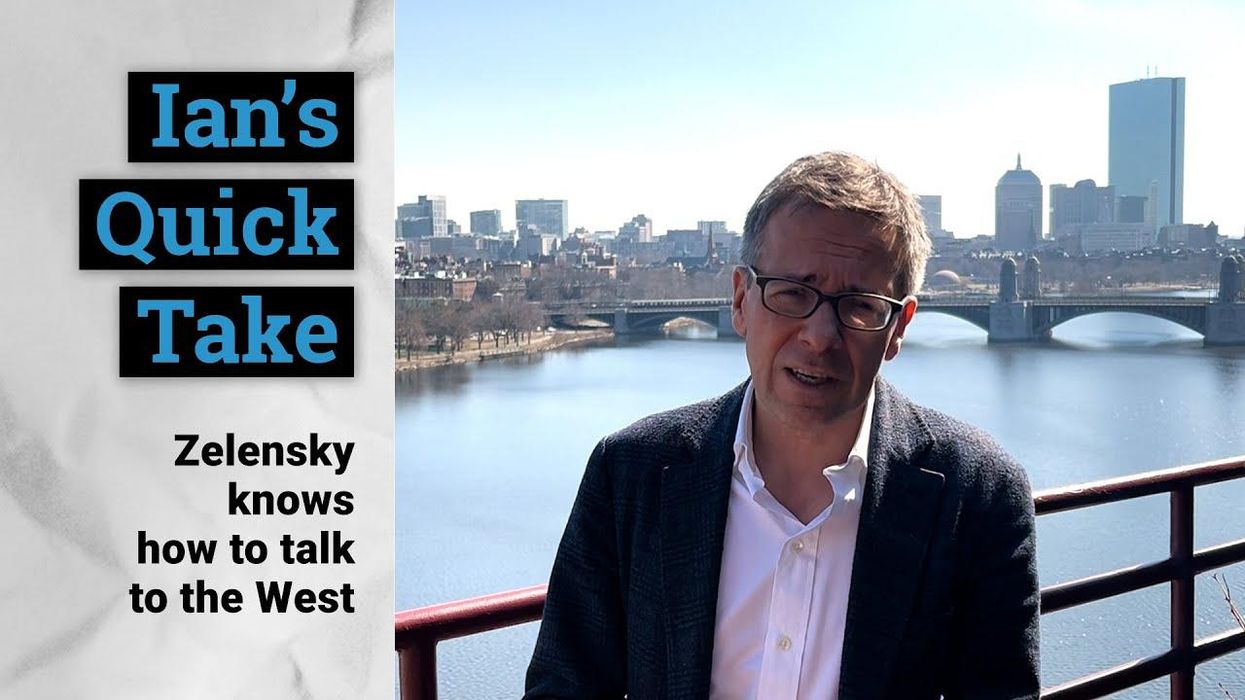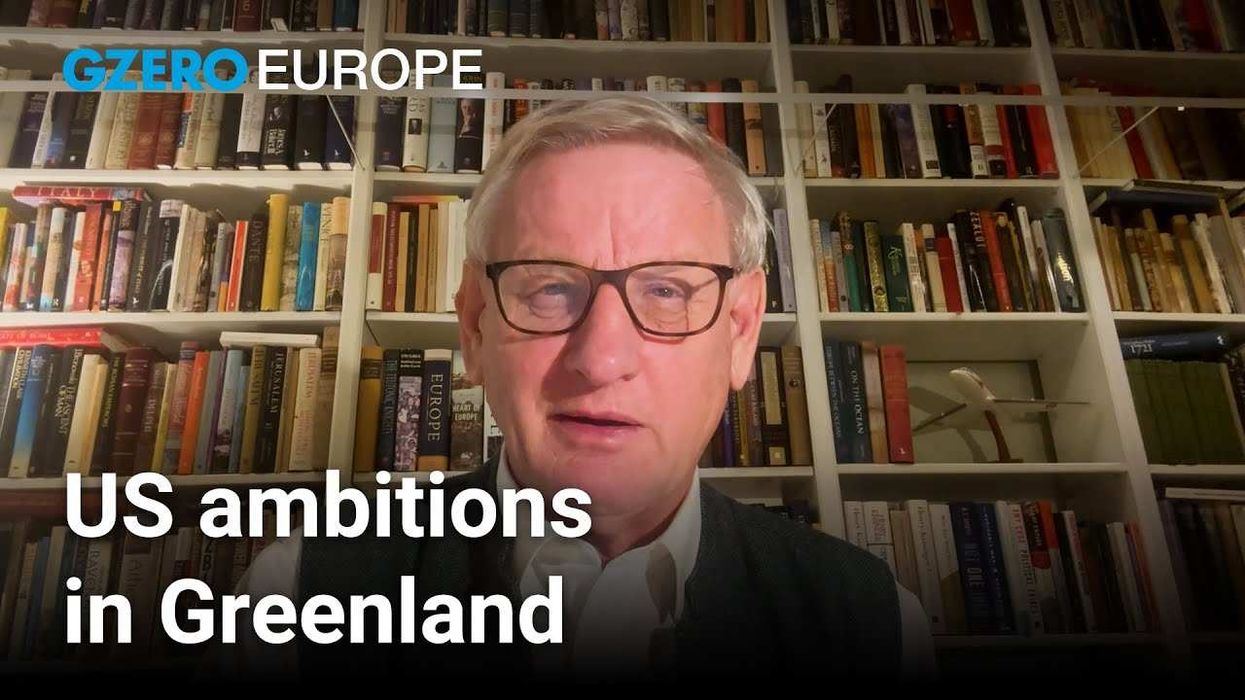VIDEOSGZERO World with Ian BremmerQuick TakePUPPET REGIMEIan ExplainsGZERO ReportsAsk IanGlobal Stage
Site Navigation
Search
Human content,
AI powered search.
Latest Stories
Sign up for GZERO Daily.
Get our latest updates and insights delivered to your inbox.
Global Stage: Live from Davos
WATCH
Ian Bremmer's Quick Take: Hi, everybody, Ian Bremmer here from Boston, I think you can tell. And more on the Russia-Ukraine issue every day.
I mean, first of all, we see President Zelensky talking now to the Canadians yesterday, to the American Congress today. His ability to directly engage with both popular groups, with the masses of these countries, with the mass media and with the members of Congress, members of Parliament to create forcing action, to provide more support for his government has been astonishingly strong over the past three weeks of war. And clearly is making a difference, not just in terms of awareness of Ukraine, but also in terms of the ability to get more support for the Ukrainians on the ground, which so far, not quite fighting the Russians to a standstill, but certainly allowing the Ukrainians more capacity to fend off the Russians than anyone would've otherwise expected.
No support really for the no-fly zone that Zelensky was talking about in Congress earlier today, though I'm sure it'll get some media, but a lot of support for a lot more military aid, a lot more humanitarian aid, a lot more broad economic support for the Ukrainians, which I think is going to continue and not just from the Americans, but from pretty much every advanced industrial democracy around the world. Heck, even the Japanese government at this point is sending defense equipment and is opening their borders to Ukrainian refugees. Really shows the power of Zelensky and also shows just how much Vladimir Putin has managed to antagonize and alienate pretty much every democratic leader around the world.
There are of course also negotiations that are going on right now. And increasingly those negotiations are becoming specific. They're talking about the fact that Ukraine would have neutral status. Ukraine would not be getting a direct ability to be a part of NATO. Of course, that wasn't happening anyway, but would get some direct defense guarantees from the United States, from the United Kingdom, from perhaps Turkey that are similar to the defense guarantees that they were ostensibly given back in 1994 with the Budapest Memorandum. You'll remember that was when they gave up their nuclear weapons. And in return, everyone said, "Oh, We're going to defend your territorial integrity,” except it wasn't worth the paper it was printed on. This time, they want real and binding defense guarantees, which the Russians in principle would also be standing up to.
Do I think this is plausible? Well, I'm glad they're negotiating. I will say that there is very little reason to put any actual trust in anything that Russian diplomats or the Russian president has to say. Remember, they were absolutely swearing up and down and directly to leaders of the world that there was going to be no invasion of Ukraine. We saw where that got. Furthermore, even if there were an agreement and the sides are still very far apart, even if there was a cease-fire, that doesn't mean that the Russians wouldn't break it and just take advantage of the ability to bring more troops, volunteers they're trying to grab from places like Syria, from Chechnya, from Russian troops in Armenia and Georgia being sent over. How do we know that a week later, we're just not going to see a better armed Russia that resumes its fight in Ukraine and into Kyiv?
We don't, the answer is we don't. So we should remain very skeptical about whether or not there's any possible deal that could potentially hold, but perhaps a more important point, leaving aside the war on the ground in Ukraine, that the relationship between the West and Russia is broken. And irrespective of any potential cease-fire or peace deal, the fact is the Europeans are going to take national security very differently. They will be spending much more. There will be forward deployments, permanent deployments in the Baltic states, for example.The Swedes, the Finns will want to join NATO. They're no going to be stopped from doing so by the NATO countries.
And that the dependence that the European economies had had on Russia is going away. And if you look at geography and you look at where the Russian population is located, where their infrastructure is located, and then look at Europe, you see that that's the natural market. Asia's not the natural market. So the impact this is going to have on a Russian economy that is about to default on its foreign debt is massive and permanent. And that is something that we're going to have to be thinking about a lot more going forward.
Anyway, a few minutes from me. Hope everyone's well. I'll talk to you all real soon.
Keep reading...
Show less
More from Quick Take
Europe takes control of Ukraine’s future
December 15, 2025
Trump’s new national security strategy targets Europe
December 08, 2025
Trump, Russia, and a deal Ukraine can’t accept
December 02, 2025
Europe divided as US pushes Ukraine-Russia peace deal
November 24, 2025
Trump escalates sanctions against Russia
November 10, 2025
Is Abu Dhabi becoming the global capital of AI development?
November 02, 2025
What the Trump-Xi meeting means for US-China relations
October 30, 2025
Trump’s East Wing demolition, Binance pardon, and tariffs on Canada
October 27, 2025
Trump brokers peace: Hostages freed and guns fall silent in Gaza
October 13, 2025
Trump's role in brokering Israel-Hamas deal
October 09, 2025
America’s short-term wins vs. long-term risks
October 06, 2025
Israel is facing real consequences over Gaza annexation plans
September 29, 2025
Is Israel risking global isolation over Gaza?
September 22, 2025
Charlie Kirk's assassination will make things worse in the US
September 15, 2025
Russia-Ukraine war escalation
September 08, 2025
China’s push for a new world order
September 02, 2025
Is the US preparing to strike Venezuela?
August 27, 2025
Is American capitalism still capitalism?
August 25, 2025
Zelensky, Trump, and NATO: A united front on Ukraine?
August 18, 2025
Trump and Putin to meet in Alaska to discuss Ukraine
August 11, 2025
US government rescinds West Point role for former cyber director
August 04, 2025
US-EU trade deal marks a win for Trump
July 28, 2025
The US, China, and the critical minerals question
July 21, 2025
Epstein conspiracies divide Trump's MAGA base
July 14, 2025
US-Brazil relations in crisis
July 10, 2025
Elon Musk vows to start a new political party
July 07, 2025
What Zohran Mamdani’s win really signals for US politics
June 30, 2025
Iran's retaliation shows strategic weakness
June 23, 2025
US enters war with Iran: What comes next?
June 22, 2025
Iran looks to negotiate ceasefire
June 16, 2025
Elon vs. Trump: Billionaire fallout goes public
June 06, 2025
Elon Musk steps down from Trump administration
May 29, 2025
Trump's weekend of geopolitical success
May 12, 2025
Can Trump and Carney reset US-Canada relations?
May 07, 2025
Trump’s ‘less is more’ message is un-American
May 05, 2025
Ian Bremmer on Trump's first 100 days
April 28, 2025
Trump’s America: A kleptocracy but not a police state
April 23, 2025
Inside the Harvard-Trump showdown
April 21, 2025
Can the US win by undoing globalization?
April 14, 2025
Who benefits from Trump's tariff wall?
April 07, 2025
Trump's tariffs & the end of globalization
April 03, 2025
Leaked Signal chat shows Trump team's mindset
March 26, 2025
What Trump team's war plans leak revealed
March 25, 2025
Is Europe in trouble as the US pulls away?
March 24, 2025
Putin-Trump Ukraine call is a small win for both sides
March 18, 2025
What will Trump offer Putin in Ukraine ceasefire talks?
March 17, 2025
Ukraine ceasefire deal now awaits Putin's response
March 11, 2025
Can Europe broker a Ukraine ceasefire?
March 03, 2025
What Trump-Zelensky fallout means for Ukraine war
March 01, 2025
Why the US-Ukraine minerals deal changed
February 26, 2025
Germany's close election limits its ability to lead Europe
February 24, 2025
Ukraine hopes for Europe's help as US negotiates with Russia
February 18, 2025
JD Vance stuns Munich conference with critique on European democracy
February 14, 2025
Trump-Putin chat over Ukraine "deeply" worries Europe
February 13, 2025
What is Trump's Gaza playbook?
February 10, 2025
Why cutting USAID will hurt American foreign policy
February 05, 2025
Why is Trump starting a trade war with Canada?
February 02, 2025
How Trump's assertive foreign policy impacts international relations
January 27, 2025
Trump's Davos address sets up big shifts in US strategy
January 24, 2025
From Davos: How global leaders are grappling with Trump’s return
January 20, 2025
Ian Bremmer on the forces behind the geopolitical recession
January 17, 2025
What Greenlanders might want from a deal with Trump
January 13, 2025
New Year's Day terror attacks highlight America's divisions
January 03, 2025
GZERO Series
GZERO Daily: our free newsletter about global politics
Keep up with what’s going on around the world - and why it matters.















































































